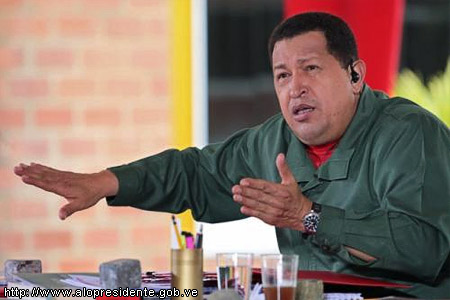Hugo Chavez the Prime Target for the US Intelligence Community
February 16, 2011

There are influential circles in the US which maintain that the assassination of Chavez would leave his followers split, trigger a demise of the ALBA bloc, and de-energize the Union of South American Nations (UNASUR) along with other regional alliances. In Cuba, R. Castro's anticipated reform would have to unfold in much less favorable settings without the current discount oil supply from Venezuela. As for Venezuela, Chavez's death might propel to power a cohort of politicians eager to buy Washington's favors at any cost, for example, at that of major concessions in the sphere of oil policy. They would likely insulate Venezuela from Washington's geopolitical rivals such as China, Russia, and Belarus, scrap the republic's space exploration and nuclear energy programs, and altogether make Venezuela forget about Chavez's XXI century socialism.
Killing a politician as popular in the ranks of the left and nationally oriented movements as Chavez is by all means a risky plan. Chavez says that if he is killed, that would no doubt be done on Washington's order and Latin America would then face a century of an anti-imperialist war. Chavez is known to have survived at least a hundred of attempts on his life. Snipers were routinely caught in the proximity of sites where rallies Chavez was going to attend convened, grenade launchers which were supposed to be used to attack Chavez's aircraft were confiscated, and killers for hire from Columbia's paramilitary groups were arrested for hunting Venezuela's leader.
Chavez told how he met the US military during his army career. In July, 1990, president Carlos Perez promoted Chavez to the rank of colonel by a personal decree, and intelligence operatives from the US military mission were among those who delivered congratulations. Studying the personalities of Venezuelan officers with an eye to future cooperation was of course part of the operatives' service duties. Chavez has never met US officers ever since. Probably, he acted too independently to be liked. In a year Chavez became the commander of a brigade of paratroopers which took part in an armed uprising.
N, a woman who worked for Venezuela's intelligence service, told in an interview to Cubadebate that initially neither the Venezuelan administration nor the US embassy took Chavez's interest in politics seriously. He and his colleagues received court sentences and were put in jail after the events of February 4, 1992, but were released two years later when the president granted them amnesty.
In 1994, Chavez toured Latin American countries to build ties with ideologically close political parties and groups. The pillars of his program were nationalism, patriotism, and the theoretical legacy of the great Venezuelans Miranda and Bolivar who liberated the country from the Spanish colonialism. In December, 1994, Chavez visited Cuba where Fidel, mindful of the Venezuelan guest's political potential, met him right at the airport.
N said Chavez's trip to Cuba led the CIA to start watching over “the Venezuelan marginal politician”. Assisting its senior partner, Venezuela's DISIP secret police focused on Chavez's connections, projects, program, and, especially, the Cuban links, but failed to unearth anything that might compromise him. Chavez was an independent figure and had no outside support. For a long time, Argentinian Norberto Ceresole remained his only foreign adviser. Chavez borrowed Ceresole's formula “Leader + Army + Nation” which was instrumental in the populist leader's ascension to power. Ceresole also introduced Chavez to the realm of conspirology. He was the man who explained to Chavez the concepts of plutocracy and the shadowy workings of B'nai Brith, the Bilderberg Club and likewise organizations. Eventually, Ceresole was deported from Venezuela, evidently as a result of the pressure exerted by the CIA and Mossad.
The CIA threw its support behind Chavez's rival Salas Romer in the 1998 elections but Chavez won with 56.2% of the vote against 40%, thus causing Washington another headache. From the dawn of Chavez's presidency, populist reforms met with open resistance from the opposition and were undermined secretly by the fifth column in the camp of Chavez's supporters. The CIA poured money massively into conspiracies in the Venezuelan army. The activity culminated in the April 11-13, 2002 coup, but a tide of popular support helped Chavez regain and strengthen his presidential status. He plans to run in the 2012 elections, angering the Empire and the domestic opposition.
In 2010 – the early 2011, the possible murder of Chavez grew into a recurrent theme in Venezuela's oppositional media. One gets an impression that the population is taught to think of it as something inevitable, and the situation increasingly resembles a computer game. Recently an engineer from a Venezuelan state-run electric power company posted on the Web a composed picture of slain Chavez with his face destroyed by bullets. The media keep broadcasting statements like “The country needs someone to save it from the tyrant”. Such urgings are a usual element of the CIA long-term programs – a fanatic with a gun or a bomb could help the agency see its old dreams come true.
Chavez charged the US administration with instigating terrorist attacks against him, and indeed there is no shortage of evidence. The CIA operates a training camp in Florida where potential killers exercise. Banker Guillermo Zuloaga is the key figure in the plot – he opened a fund-rising campaign to collect money to pay the terrorists. Zuloaga fled to Miami when the Venezuelan administration opened a probe into his illicit financial transactions and his complicity in the assassination of prosecutor Anderson who launched a private investigation into the April, 2002 coup.
According to Chavez, the would-be killers are promised $100m for the job – surprisingly little considering the net worth of Venezuela's oil and gas reserves.